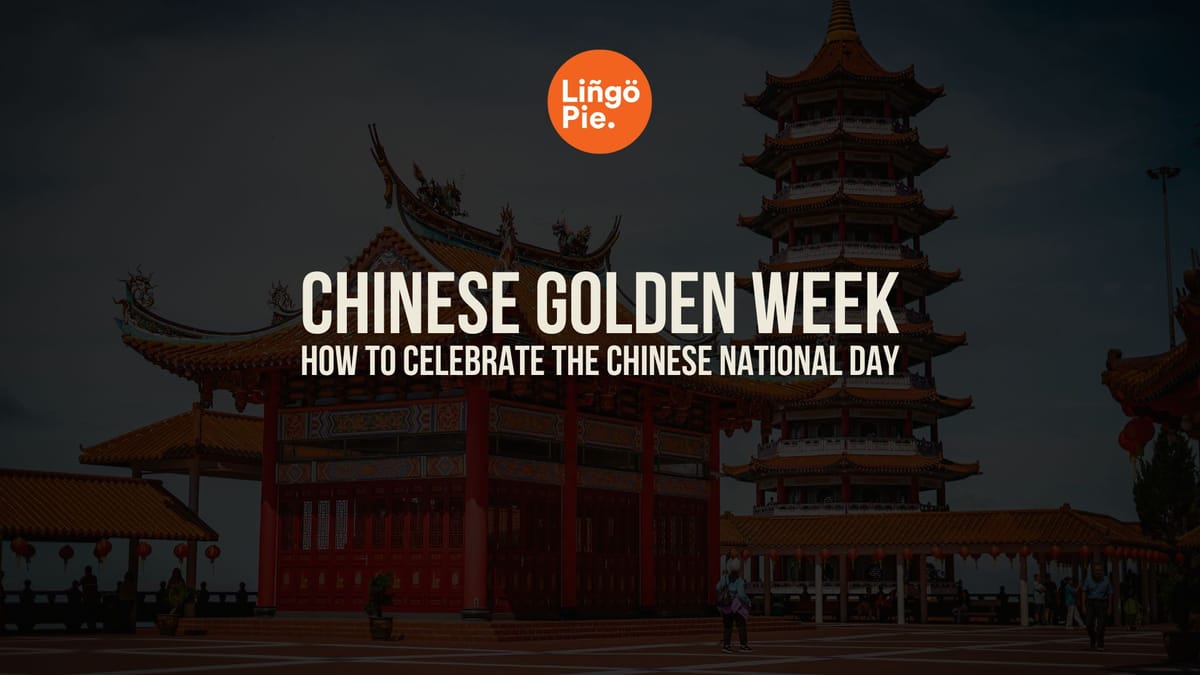Right now, one of the world’s biggest celebrations is happening, and most people outside China have never heard of it. In China, 1.4 billion people are celebrating the first day of Chinese Golden Week—the country's most anticipated holiday. It’s a fascinating contrast to other major observances in the Chinese calendar, such as Ghost Month, which carries very different traditions and cultural meaning.
In this post, I’ll show you what National Day Golden Week is really about and how it's totally different from Chinese New Year. Plus, I’ll share essential Chinese vocabulary for talking about holidays and family, perfect for anyone starting their Chinese learning journey.
- 60 Chinese Slang You’ll Definitely See on Xiaohongshu
- 20+ Chinese Curse Words And Meanings Explained
- 6 Best Chinese Dramas On Netflix Every Fan Should See

What Is National Day In China?
National Day, known as 国庆节 (Guóqìngjié) in Chinese, is celebrated annually on October 1st to commemorate the founding of the People's Republic of China in 1949. This date marks a pivotal moment in Chinese history when Chairman Mao Zedong proclaimed the establishment of the new republic from Tiananmen Square in Beijing.
The holiday has evolved into what is now called Golden Week, a seven-day national holiday that runs from October 1st to 7th. The Chinese government creates this extended break by combining the three official National Day holidays with adjacent weekends and designated rest days.
When Is National Day In China?
National Day falls on October 1st every year. In 2025, Golden Week runs from October 1st through October 8th—that's 8 days total because Mid-Autumn Festival coincides with National Day this year, creating an extra-long holiday period.
Is National Day A Public Holiday In China?
Yes, National Day is one of China's most important public holidays. The government designates three official days off for National Day (October 1st-3rd), which are then extended into a full week by connecting with weekends and additional mandated rest days. All government offices, schools, and most businesses close during this period.

What is Golden Week in China?
The term "Golden Week" refers to these extended holiday periods that boost domestic tourism and give families rare opportunities for long-distance travel and reunions. Technically, China has two golden weeks: the Chinese New Year Golden Week and the National Day Golden Week.
Chinese New Year Golden Week
Chinese New Year Golden Week occurs in late January or February, following the lunar calendar. This is China's most important holiday, focused on family reunions, traditional celebrations, and honoring ancestors. During this period, most people travel back to their hometowns.
National Day Golden Week
National Day Golden Week occurs every October 1st-7th (8 days in 2025) and celebrates the founding of modern China. Unlike the Chinese New Year's family focus, National Day Golden Week is more about patriotic celebration and leisure travel. People use this time for sightseeing, visiting tourist destinations, and enjoying China's autumn weather, making it the country's biggest tourism week of the year.

Key Chinese Vocabulary For National Day
Learning these essential Chinese words will help you understand Golden Week conversations and connect with Chinese culture during this important celebration. Whether you're watching the festivities online or planning to experience them firsthand, these terms are your gateway to understanding how Chinese people talk about their biggest national holiday.
- 国庆节 (Guóqìngjié) – National Day
- 十月一日 (shí yuè yī rì) – October 1st (often shortened to 十一 when referring to National Day)
- 黄金周 (huángjīn zhōu) – Golden Week
- 国庆节快乐! (Guóqìng jié kuàilè!) – Happy National Day!
- 国旗 (guóqí) – national flag
- 家庭团聚 (jiātíng tuánjù) – family reunion
- 放假 (fàngjià) – to have a holiday/time off
- 旅游 (lǚyóu) – to travel/tourism
- 庆祝 (qìngzhù) – to celebrate
- 爱国 (àiguó) – patriotic
- 升旗仪式 (shēngqí yíshì) – flag-raising ceremony
- 天安门广场 (Tiān'ānmén Guǎngchǎng) – Tiananmen Square
- 传统 (chuántǒng) – tradition
- 烟花 (yānhuā) – fireworks
- 阅兵 (yuèbīng) – military parade
- 节日快乐 (jiérì kuàilè) – Happy holidays!
How Is National Day Celebrated In China?
National Day transforms China into one massive celebration, but the festivities happen on two levels: official government ceremonies and personal family celebrations.
Official Celebrations
Beijing takes center stage during National Day, with Tiananmen Square hosting the country’s most important ceremonies. The day begins with a formal flag-raising ceremony at sunrise, followed by military parades that showcase China’s latest achievements and military capabilities.
Throughout the day, the capital features fireworks displays, cultural performances, and patriotic exhibitions that draw massive crowds.
Personal Celebrations
For most Chinese people, National Day week means finally having time for what matters most: family and travel. Government offices, schools, and businesses shut down completely, creating a rare opportunity for long-distance family visits. Many people return to their hometowns, while others use the break for domestic tourism, visiting famous landmarks like the Great Wall, West Lake, or mountain destinations.
Should You Visit China During The Golden Week?
Honestly? Probably not, unless you enjoy massive crowds. Celebrating the Golden Week means 1.4 billion people traveling simultaneously. Train tickets sell out in minutes, flight prices triple, and popular attractions become overcrowded. Even hotels raise their rates significantly during this period.
However, if you visit during Golden Week, you’ll witness China at its most celebratory. The patriotic energy is infectious, and you’ll experience domestic tourism on an unprecedented scale.
FAQ
When is Chinese Golden Week 2025?
National Day Golden Week runs from October 1 to 8, 2025. This year, it's eight days because the Mid-Autumn Festival coincides with National Day.
Is Golden Week the same as the Chinese New Year?
No, China has two golden weeks. Chinese New Year Golden Week occurs in January/February and focuses on family reunions. National Day Golden Week occurs in October and celebrates China's founding.
Do businesses close during Golden Week?
Yes, government offices, schools, and many businesses close for the entire week. Some restaurants and tourist services remain open but with limited hours.
Can foreigners visit China during Golden Week?
Yes, but expect massive crowds, higher prices, and fully booked accommodations. Most tourist attractions will be extremely busy.
How do Chinese people typically spend Golden Week?
Most people either travel domestically to tourist destinations or return to their hometowns for family visits. It's one of the few times Chinese workers get a full week off.
Why is it called "Golden Week"?
The name refers to the economic boost from tourism and spending during this period. It's "golden" for businesses, especially in the travel and hospitality industries.
Are there any special foods eaten during National Day?
Unlike Chinese New Year, National Day doesn't have specific traditional foods. People often enjoy regional specialties while traveling or have family meals together.
Start Your Chinese Journey with Lingopie
Golden Week offers just a glimpse into China’s rich culture and traditions. To truly understand celebrations like these, you need to learn the language behind them. Lingopie makes learning Chinese engaging and practical by teaching you through real Chinese shows, movies, and cultural content.
Ready to explore Chinese culture and language more deeply? Try Lingopie today and start understanding China beyond the headlines.









